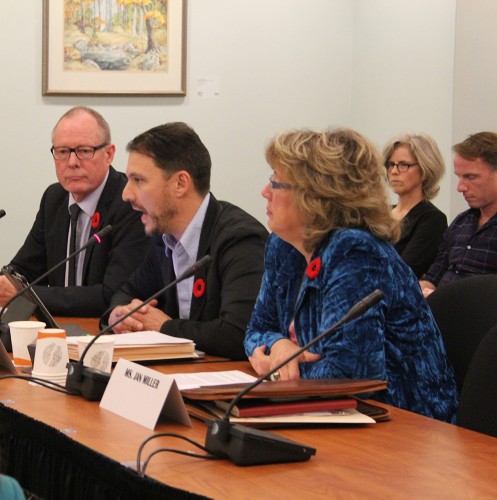Provincial government gives promotional funding to Screen Nova Scotia
Grant meant to help the film industry after tax credit alterations earlier this year

caption
Left to Right: Scott Simpson, Bill Niven, and Jan Miller represent Screen Nova Scotia.
caption
Left to Right: Scott Simpson, Bill Niven, and Jan Miller represent Screen Nova Scotia.Nova Scotia’s film industry is receiving money from the provincial government to capture the interest of the world’s filmmakers.
Screen Nova Scotia will receive up to $475,000 over the next two years from a provincial grant to replace the infrastructure lost earlier this year.
In June, a $24-million per year film tax credit, which offered rebates of up to 50 per cent of labour cost, was replaced by a $10-million fund which offered 25 per cent rebates.
Important message for @Screen_NS members – gov’t announces funding for industry infrastructure #NSfilmjobs #NSpoli https://t.co/f3ix9hcd0M
— Screen Nova Scotia (@Screen_NS) November 6, 2015
Screen Nova Scotia announced the provincial grant over Twitter.
Geoff D’Eon, a Halifax-based television producer who works with Screen Nova Scotia said the grant will be used to promote the province’s film industry.
“We’re receiving the money to promote Nova Scotia as a place with talented crews and a place where great screen projects can be completed,” he said. “This is work that was previously done by Film and Creative Industries Nova Scotia up until the April budget cuts. This funding allows Screen Nova Scotia to take on some of the work that was being done.”
How the money will be spent
Tara McClair, operations manager at Screen Nova Scotia, said details on how the funding will be spent could not be shared at this time.
“We’re currently not in a position to speak publicly about the funding,” she said in an email. “Final plans have not yet been approved by the board and our membership. Once the details have been approved internally, we’ll be able to better present a detailed plan for the funding.”
Other issues with Nova Scotia’s film industry
There is still a lot of work to be done to stabilize the film industry, Screen Nova Scotia said in an open letter. Representatives from Screen Nova Scotia and Nova Scotia Business Inc. (NSBI) met yesterday to further discuss other pressing issues facing the industry with Nova Scotian MLAs.
D’Eon said the meeting is an opportunity for MLAs to get informed on how the new incentive program is working.
“We see it as an educational opportunity for all parties,” he said. “It’s an opportunity for us to gain insight into NSBI and how they think the program is working and for them to see how the industry thinks it’s working. This is a good initiative. Everybody wants the same thing. Everybody wants a vibrant film industry that employs Nova Scotians.”
Screen Nova Scotia was represented by its vice-chair Scott Simpson, international consultant Jan Miller, and Northeast Films producer Bill Niven.

caption
Screen Nova Scotia argued for the Nova Scotia Film Industry at a Standing Committee for Economic Development meeting on Tuesday.Simpson said they accomplished what they wanted to at the meeting.
“It was our objective to provide information and make sure as many people as possible are informed as to what the past and present conditions of the industry are,” he said. “And also to talk about our aspirations going forward.”
A key issue at the meeting was making Nova Scotia competitive with other jurisdictions. Simpson said this is an issue of trust. The $10-million budget allocation cap–money the government has dedicated to the film industry to give to projects–would scare business away.
“Our industry depends a great deal on investment confidence,” said Simpson. “In order to be competitive with other jurisdictions, there needs to be some security that the money we get from the province is going to be available. We need to say that with confidence. With a budget allocation cap, broadcasters, distributors, and partners won’t have that assurance. So all things being equal, they are likely to go with a different project from a different producer from a different part of the world.”
Simpson said even with uncapped funding, there’s no easy solution for Nova Scotia’s film industry.
“There isn’t one, particular move that would solve all of our problems,” he said. “It’s a combination of steps that need to be taken. I think of the most significant issues that we’re facing as steps that we can take to go forward. [Fixing] any one of them would make a big change, but I think it’s a combination of elements that are required for us to be really stable and start to grow back up.”
A question of fairness
Critics of the grant say it’s unfair for the government to give funding to advocacy groups.
Kevin Lacey, Atlantic Canada director of the Canadian Taxpayers Federation said taxpayer money should help all industries.
“It’s not the role of government to support advocacy,” he said. “What the government should be doing instead is looking at ways to improve the economy more generally for all industries equally. A job created in the film industry will create the same benefits for the province as a job created in another industry.”
Lacey said the government shouldn’t play favourites with one industry over another.
“We should be reducing the tax burden and making it competitive for all industries equally. The big problem with incentives to one industry is that we end up incentivizing one industry using the tax dollars of somebody else’s and there’s an inherent unfairness in that,” he said.

